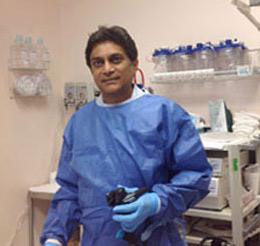
Esophageal pH Testing
allows the physician to obtain a numerical
score corresponding to the amount of acid
that refluxes into your esophagus from the
stomach. The procedure is used to more
precisely quantitate the severity of acid
reflux or to exclude it from consideration.
Additionally, the tests helps to determine
if there is a correlation between acid
regurgitation and symptoms such as chest
pain, cough, asthma, hoarseness or throat
soreness.
The procedure is generally
performed by a specially trained nurse.
Specialists in Gastroenterology perform this
test. For the procedure, you will relax in a
sitting position on the examining table. No
sedation is generally needed as the test is
not painful and any mild discomfort is
usually short lived. The nurse will gently
pass a very thin flexible tube through the
nose and into the esophagus. At several
locations on the tube are sensors that
monitor pH—the measure of acidity. The tube
is taped behind your ear and then brought
down to a recording device at your waist.
Over the next 24 hours a continuous
measurement of acidity is then recorded
while you eat, run errands and even sleep.
If you experience a symptom such as
heartburn or cough, you can press a button
on the recorder to document the time of the
symptom so that the acid measurement can be
correlated to it. You return to the
outpatient department at the hospital the
next morning where the tube is gently
removed and the recording device attached to
a special computer that will generate a
report of your test.
There are no serious
risks associated with esophageal pH Testing.
The possible side effects include a mild
sore throat and temporary irritation of the
nasal passages. Some mild gagging may occur,
however, once the tube is in place it is
usually easily tolerated.
You are
ready to go in about 30 to 45 minutes on the
day of placement and can drive yourself
home. You can go to work while the tube is
in place and are encouraged to perform your
usual daily activities as this will give an
accurate test. On the return day, only 10-15
minutes are needed to gently remove the
tube.
Preparation For Esophageal pH Testing
In general it is recommended that you have nothing by mouth for 6 hours prior to the procedure. Medications should generally not be taken on the morning of the examination, but can be taken immediately on its completion. Additionally, your physician may or may not want you to stop all acid suppressing medication such as Prilosec, Zantac, Prevacid, Protonix, Aciphex, Nexium and the like a week before the examination. Other medications may need to be discontinued prior to the test. Check to be sure you know whether these are to be continued or not. During the test you may eat and drink normally. In fact, you would want to adhere to the diet that best CAUSES the symptoms that are being investigated. Bring all of your medications with you and wear loose fitting clothing.Please contact us for additional questions regarding esophageal pH testing.
